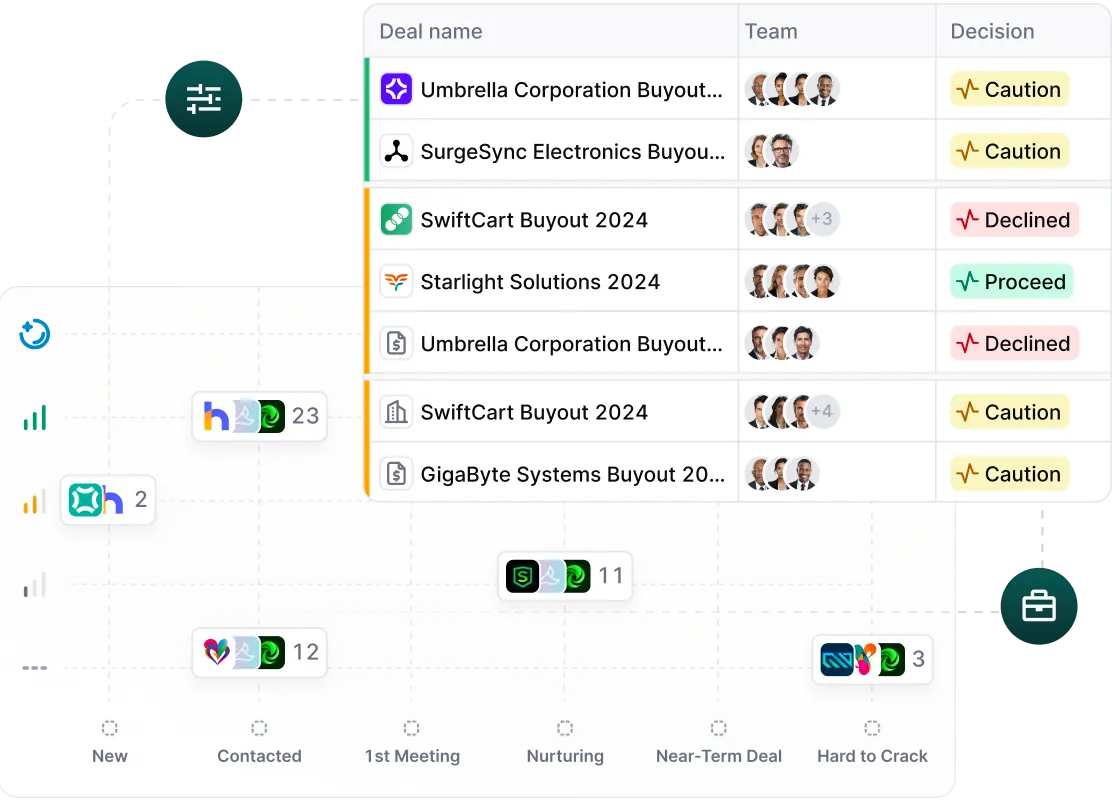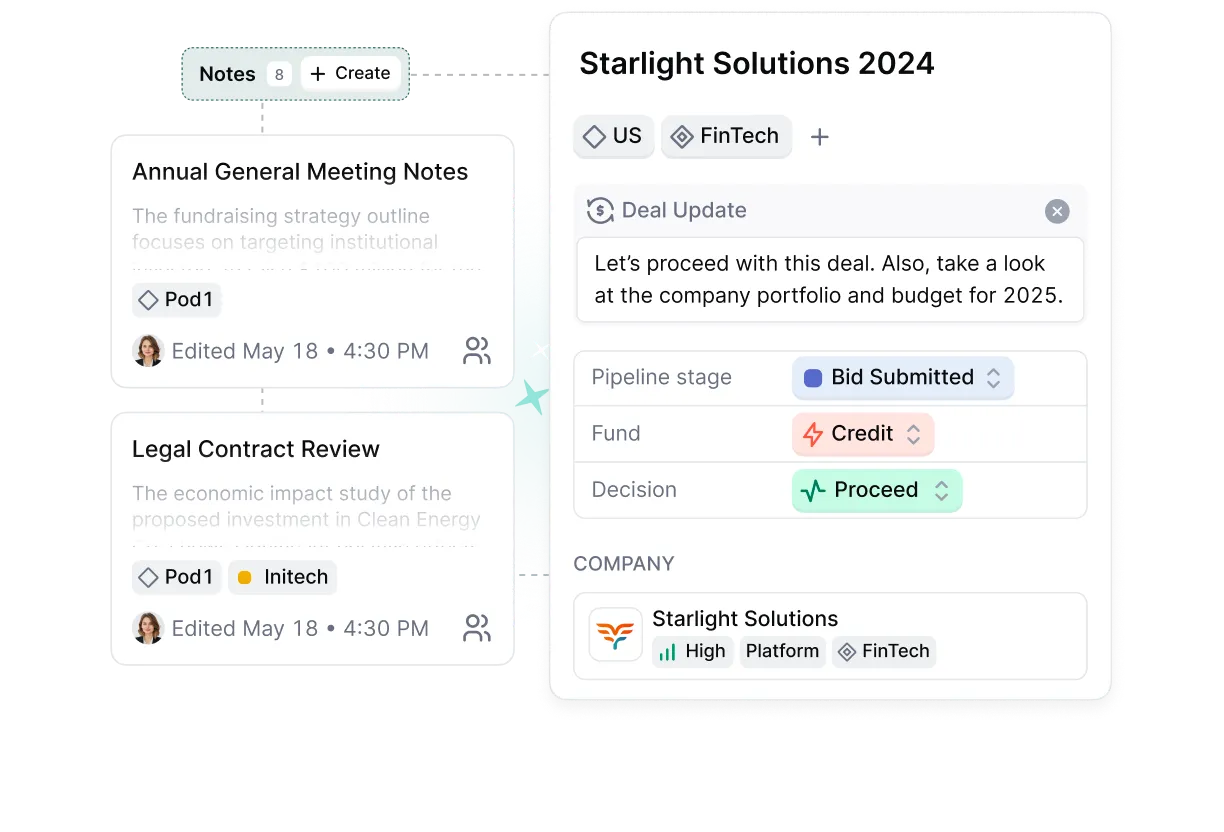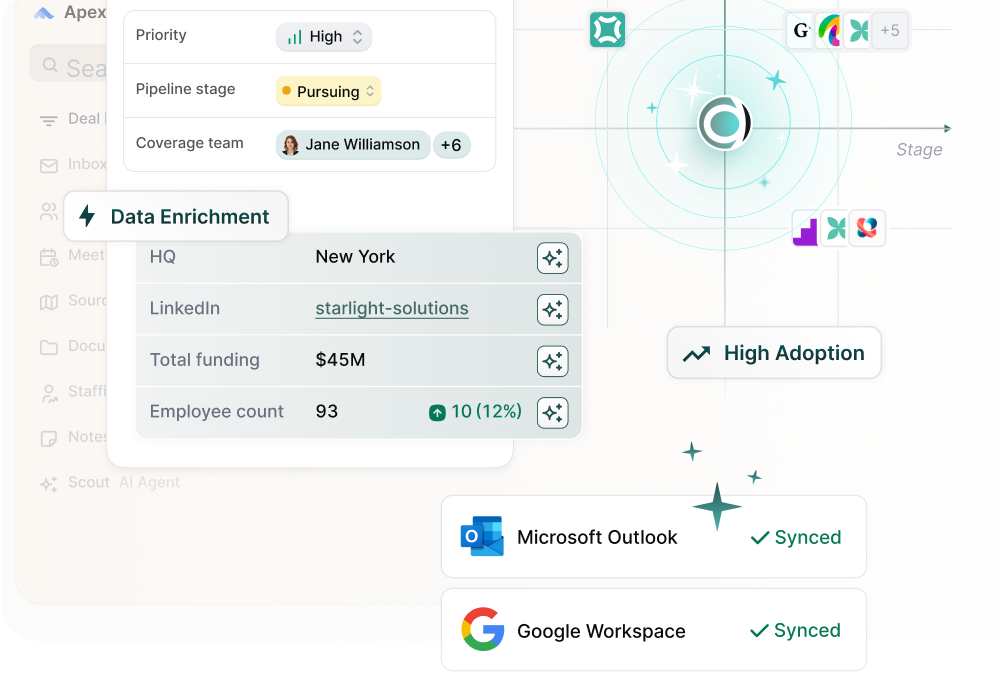Meridian raises $7M seed round led by 645 Ventures.
Read More
Discover how outdated deal flow costs PE firms millions in missed opportunities and how AI-powered solutions are helping leading firms transform their deal management processes.

In an industry where a single missed opportunity can mean hundreds of millions in unrealized returns, why are we still running deal pipelines the same way we did two decades ago?
Today's PE landscape is a complex web of direct outreach, proprietary networks, and multi-channel sourcing strategies, and top firms see thousands of deals annually across dozens of channels.
Each one needs to be tracked, evaluated, and acted on quickly. Miss a critical email, forget to log a meaningful conversation or lose track of a promising lead, and you've just watched millions in potential returns walk out the door.
Yet somehow, we're still trying to manage this complexity with legacy tools built for selling fax machines. It’s time to take a closer look at where so many PE firms are going wrong in deal flow management and explore how modern AI-powered tools like Meridian are transforming the process.
Private equity is more crowded and competitive than ever before; the annual number of PE deals in the US has increased nearly twofold in the past two decades. Your firm’s success hinges on getting in front of deals before a growing number of competitors. Unfortunately, many PE firms are hemorrhaging value through messy deal flow management.
If your associates are each running their own manual pipeline spreadsheets, you’re missing out on the collaboration, coordination, and data integrity that enable your firm to get ahead of crucial deals.
Or say you’re head of healthcare at a big firm. Imagine another firm closes a huge deal, right under your nose, and you somehow didn’t even know it was happening. Even worse, you spoke with the company's CEO six months ago but forgot to follow up. Your firm’s performance isn’t just on the line: your professional reputation may be as well.
Missed deals and opportunities also damage LPs’ respect and trust in your firm. LPs are keeping an increasingly close eye on the deals your firm can secure. With more PE firms than ever before, missing out on opportunities could be a reason for LPs to head over to a competitor.
If an LP asks you why you missed certain investment opportunities, you need to be able to deliver an answer that’s backed by data if you want to remain relevant to them.
Whether you’re an analyst or a partner, your job is to get in front of good deals before your competitors. But how can you make data-driven investment decisions when half of that data is buried in email threads and the other half is collecting dust in outdated systems?
Here are some of the most common pitfalls that hinder firms’ ability to manage deal flow.
We built Meridian because we lived this pain firsthand at firms like Blackstone, Thoma Bravo, and CVC. And we knew there had to be a better way.
Want to update your CRM? With Meridian, you can just forward an email stating, "Log meeting notes for this company." Our AI handles the rest: extracting key insights, updating relevant records, and ensuring critical information is centrally accessible.
Or maybe you’re looking for deals similar to one you recently evaluated? Our AI instantly benchmarks against your historical data, enriched with information on 26 million companies. You won't have to dig through old CIMs or piece together fragmented data again.
Need to share insights with your team? Meridian syncs automatically with Outlook, creating a single truth source that everyone uses. No more data silos, no more manual logging and no more missed opportunities.
And if you want to build your firm’s thematic expertise and get in front of more opportunities in a certain industry, Meridian comes with tools that enable faster, smarter industry research and deal sourcing.
The future of private equity isn't just about finding the right deals; it's about having the right systems to evaluate, track, and act on them efficiently. The firms that understand this are already gaining an edge
Meridian brings your entire pipeline into one powerful platform built for private equity.

How your team evaluates deals and moves them through the pipeline sets you apart from competing firms. Here’s how the strongest players approach the deal flow process to target and close the best investment opportunities.
Healthy deal flow starts at the sourcing stage, and your CRM should serve as one source of truth. But if you pay for access to company data via PitchBook or Sourcescrub and expect people to manually input that information into a CRM that most of your team doesn’t even open, you’re already behind.
Meridian, for example, comes with built-in data enrichment, no extra subscriptions required. That means you get information on millions of companies and executives directly in your CRM.
Predictive sourcing tools spot trends and patterns based on past investment, and our thematic sourcing feature gets you in front of investment opportunities in the most promising industries before your competitors.
Meridian also makes it easy to track bankers and brokers, so it’s easy to see which intermediaries bring the most value and deliver the best deals, keeping your sourcing strategic and efficient.
Information becomes even more siloed when a deal team starts doing their desktop research; if everyone’s working on their own spreadsheet, no one is sharing insights.
This lack of collaboration could mean a red flag slipping through the cracks and your team wasting time looking into a deal that was never worthwhile in the first place.
But when your CRM is easy enough to use (we’re talking pulling data directly from Outlook), your whole team has all the insights they need about your deal process and everything in the pipeline, and you don’t have to rely on your people inputting valuable data manually.
Interesting deals usually go to an initial IC, and if they’re promising enough, progress to an IOI. But not every CIM that lands on an associate’s desk is worthy of making it to IC. And for firms that source hundreds, or even thousands, of deals a year, you need to make sure once a deal has been deemed weak enough to leave your pipeline, it’s gone for good.
A CRM with pipeline intelligence like Meridian logs everything that touches your pipeline, so no one wastes time bringing a deal to IC that another team member sourced four months ago.
Once IC gives the initial green light, due diligence begins. At this point, any valuable insights you surface need to end up in your CRM, which is why it’s so important to use one that automates data input.
Deal flow software also helps you better prepare for management meetings. Any valuable information an associate finds about a company should be added to your CRM, ensuring the VP attending the meeting has all the necessary background information to make the most of their time and ask the right questions.
It’s time to present your memo, but with Meridian, you’re not going in blind. Meridian’s benchmarking features leverage historic data to point out which deals are most likely to gain IC approval, so you’re not spending hours putting together a deck for a deal that’s going to be shot down instantly.
Our deal flow management software also makes it easier for firms to make informed investment choices. Meridian centralizes discussions and tracks decisions clearly, providing partners with the reliable data and insights needed to make informed decisions on whether to send a deal through to LOI.
A deal making it to LOI means the deal team has already done plenty of desktop research and due diligence, but there’s still some work to be done. Bringing in diligence providers, be it third-party bankers, lawyers, accountants, or industry experts, is a crucial part of the evaluation process.
Confirmatory diligence helps you determine whether or not you should actually close on a deal. And even if a deal looks like a good opportunity, the process helps you pinpoint potential weak areas where you can negotiate down an offer.
Making it to negotiation and closing is cause for celebration, but where pipeline management ends, portfolio management begins. For firms that see a high deal volume, a deal flow platform helps free up your team’s time to focus on the other (equally important) part of their job.
Specialized software supports the full deal lifecycle, from identifying deal opportunities and buying companies to effectively overseeing and eventually selling them.
Disorganized pipelines cost you deals, erode LP confidence and ultimately weaken your competitive position. And in private equity, every missed follow-up or lost email can mean millions in unrealized returns.
Firms that continue to rely on legacy spreadsheets and siloed tools are bleeding value while sharper competitors pull ahead. Meridian’s private equity CRM changes that. With features that centralize information, automate data input, and surface insights in real time, it gives your firm the upper hand, helping you capture more opportunities and convert them into lasting value.
Discover how Meridian can streamline deal sourcing and enhance your decision-making

Make confident, data-driven decisions to close the right deals and improve investment outcomes.

Deal flow management is the process of capturing, tracking, and advancing investment opportunities from first contact through to closing. In private equity, where thousands of potential deals surface annually, effective management ensures no opportunity slips through the cracks.
Deal flow refers to the volume and quality of investment opportunities a private equity firm sees over a given period. It’s the lifeblood of your business: without a steady stream of strong prospects, your fund has nothing to deploy capital into.
But raw quantity isn’t enough. Winning firms measure deal flow by both volume and conversion, ensuring opportunities are sourced strategically, vetted rigorously, and advanced efficiently through the investment pipeline.
The deal flow cycle is the structured journey an investment opportunity takes from sourcing to close. It starts with sourcing through bankers, brokers, proprietary networks, or direct outreach. Then, it progresses through evaluation, IC approvals, diligence, LOI, negotiation, and ultimately closing.
Deal management is the process of organizing, evaluating, and executing on investment opportunities to maximize outcomes. In private equity, this means ensuring the right people have the right insights at the right time.
Table of Contents


Gain an in-depth understanding of private equity relationship management software so you can pick the tool that best fits your firm’s needs.

